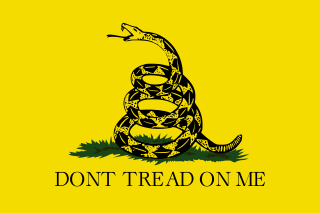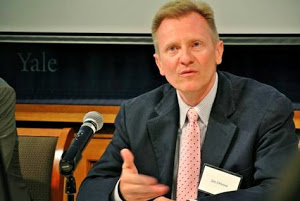
Carl Menger von Wolfensgrün was an Austrian economist and the founder of the Austrian School of economics. Menger contributed to the development of the theories of marginalism and marginal utility, which rejected cost-of-production theory of value, such as developed by the classical economists such as Adam Smith and David Ricardo. As a departure from such, he would go on to call his resultant perspective, the subjective theory of value.
Classical liberalism is a political tradition and a branch of liberalism that advocates free market and laissez-faire economics and civil liberties under the rule of law, with special emphasis on individual autonomy, limited government, economic freedom, political freedom and freedom of speech. Classical liberalism, contrary to liberal branches like social liberalism, looks more negatively on social policies, taxation and the state involvement in the lives of individuals, and it advocates deregulation.

Friedrich August von Hayek, often referred to by his initials F. A. Hayek, was an Austrian-British economist and political philosopher who made contributions to economics, political philosophy, psychology, intellectual history, and other fields. Hayek shared the 1974 Nobel Memorial Prize in Economic Sciences with Gunnar Myrdal for work on money and economic fluctuations, and the interdependence of economic, social and institutional phenomena. His account of how prices communicate information is widely regarded as an important contribution to economics that led to him receiving the prize.
Libertarian theories of law build upon classical liberal and individualist doctrines.
Leonard P. Liggio was a classical liberal author, research professor of law at George Mason University and executive vice president of the Atlas Network in Fairfax, Virginia.
The Institute for Humane Studies (IHS) is a non-profit organization that promotes the teaching and research of classical liberalism in higher education in the United States. IHS offers funding opportunities, programs, and events for faculty and graduate students seeking careers in academia as well as various fellowships.
Spontaneous order, also named self-organization in the hard sciences, is the spontaneous emergence of order out of seeming chaos. The term "self-organization" is more often used for physical changes and biological processes, while "spontaneous order" is typically used to describe the emergence of various kinds of social orders in human social networks from the behavior of a combination of self-interested individuals who are not intentionally trying to create order through planning. Proposed examples of systems which evolved through spontaneous order or self-organization include the evolution of life on Earth, language, crystal structure, the Internet, Wikipedia, and a free market economy.

The Foundation for Economic Education (FEE) is an American conservative, libertarian economic think tank. Founded in 1946 in New York City, FEE is now headquartered in Atlanta, Georgia. It is a member of the State Policy Network.
Richard M. Ebeling is an American libertarian author who was the president of the Foundation for Economic Education (FEE) from 2003 to 2008. Ebeling is currently the BB&T Distinguished Professor of Ethics and Free Enterprise Leadership at The Citadel in Charleston, South Carolina.
Ralph Raico was an American libertarian historian of European liberalism and a professor of history at Buffalo State College.

In the United States, libertarianism is a political philosophy promoting individual liberty. According to common meanings of conservatism and liberalism in the United States, libertarianism has been described as conservative on economic issues and liberal on personal freedom, often associated with a foreign policy of non-interventionism. Broadly, there are four principal traditions within libertarianism, namely the libertarianism that developed in the mid-20th century out of the revival tradition of classical liberalism in the United States after liberalism associated with the New Deal; the libertarianism developed in the 1950s by anarcho-capitalist author Murray Rothbard, who based it on the anti-New Deal Old Right and 19th-century libertarianism and American individualist anarchists such as Benjamin Tucker and Lysander Spooner while rejecting the labor theory of value in favor of Austrian School economics and the subjective theory of value; the libertarianism developed in the 1970s by Robert Nozick and founded in American and European classical liberal traditions; and the libertarianism associated with the Libertarian Party, which was founded in 1971, including politicians such as David Nolan and Ron Paul.

James R. Otteson is an American philosopher and political economist. He is the John T. Ryan Jr. Professor of Business Ethics at the University of Notre Dame. Formerly, he was the Thomas W. Smith Presidential Chair in Business Ethics, Professor of Economics, and executive director of the Eudaimonia Institute at Wake Forest University. He is also a Senior Scholar at The Fund for American Studies in Washington, D.C., a Research Professor in the Center for the Philosophy of Freedom and in the Philosophy Department at the University of Arizona, a Visitor of Ralston College, a Research Fellow for the Independent Institute in California, a director of Ethics and Economics Education of New England, and a Senior Scholar at the Fraser Institute. He has taught previously at Yeshiva University, New York University, Georgetown University, and the University of Alabama.

Ludwig Heinrich Edler von Mises was an Austrian–American Austrian School economist, historian, logician, and sociologist. Mises wrote and lectured extensively on the societal contributions of classical liberalism and the power of consumers. He is best known for his work on praxeology studies comparing communism and capitalism.
Right-libertarianism, also known as libertarian capitalism, or right-wing libertarianism, is a libertarian political philosophy that supports capitalist property rights and defends market distribution of natural resources and private property. The term right-libertarianism is used to distinguish this class of views on the nature of property and capital from left-libertarianism, a type of libertarianism that combines self-ownership with an egalitarian approach to property and income. In contrast to socialist libertarianism, right-libertarianism supports free-market capitalism. Like most forms of libertarianism, it supports civil liberties, especially natural law, negative rights, the non-aggression principle, and a major reversal of the modern welfare state.
Consequentialist libertarianism, also known as consequentialist liberalism or libertarian consequentialism, is a libertarian political philosophy and position that is supportive of a free market and strong private property rights only on the grounds that they bring about favorable consequences such as prosperity or efficiency.
The New Economic School – Georgia (NESG) is a free market think-tank, non-profit organisation, NGO based in Tbilisi, Georgia. Its main mission is education of young people in free market ideas. It organizes seminars, workshops and conferences for education and exchanges of ideas. NESG was founded by Georgian individuals to fill the gap of the market economy knowledge in the country and the deficit of good teachers and economics textbooks. According to the 2014 Global Go To Think Tank Index Report, NESG is number 22 "Top Think Tanks in Central Asia".
Ronald Hamowy was a Canadian academic, known primarily for his contributions to political and social academic fields. At the time of his death, he was professor emeritus of intellectual history at the University of Alberta in Edmonton, Canada. Hamowy was closely associated with the political ideology of libertarianism and his writings and scholarship place particular emphasis on individual liberty and the limits of state action in a free society. He is associated with a number of prominent American libertarian organizations.

Norman Patrick Barry was an English political philosopher best known as an exponent of classical liberalism. For much of his career he was a professor of social and political theory at the University of Buckingham.

Robert Christopher Sarvis is an American attorney. While attending law school, he was the co-founder and editor-in-chief of the NYU Journal of Law & Liberty; he also clerked for Judge E. Grady Jolly on the U.S. Court of Appeals for the Fifth Circuit. In addition, he has been a software developer, being named by Google as a Grand Prize Winner for their Android Development challenge.
Neoclassical liberalism is a tradition of the liberal thought that, with the premises of John Locke's classical liberalism applied to industrialized societies, stands in opposition to the welfare state and social liberalism. In the United States, the Arizona School of liberalism, also referred to as "bleeding-heart libertarianism", adopted the term neoclassical liberal to advance certain ideas of Chicago School economist Milton Friedman within the American libertarian movement, including the school voucher system and the negative income tax.








